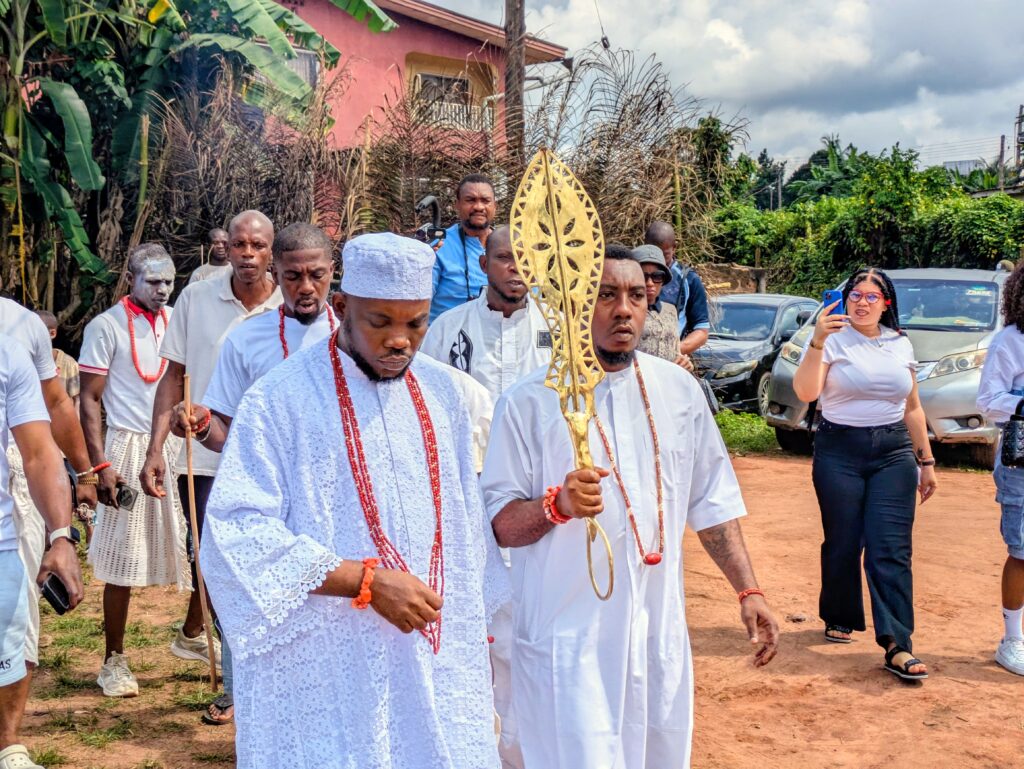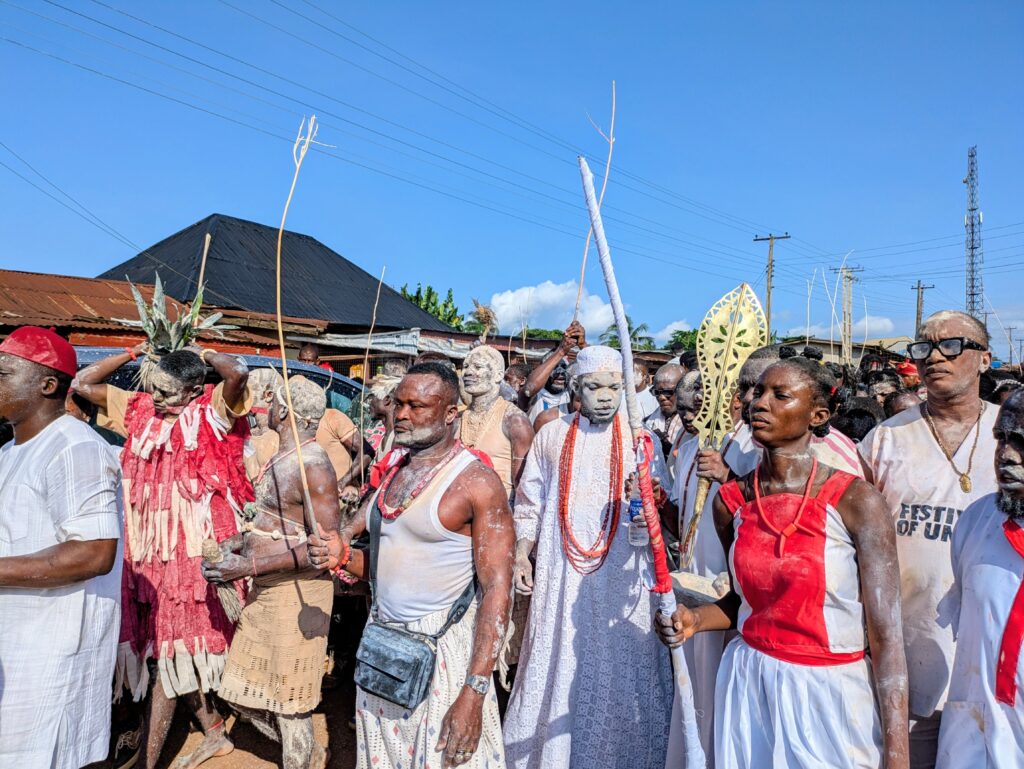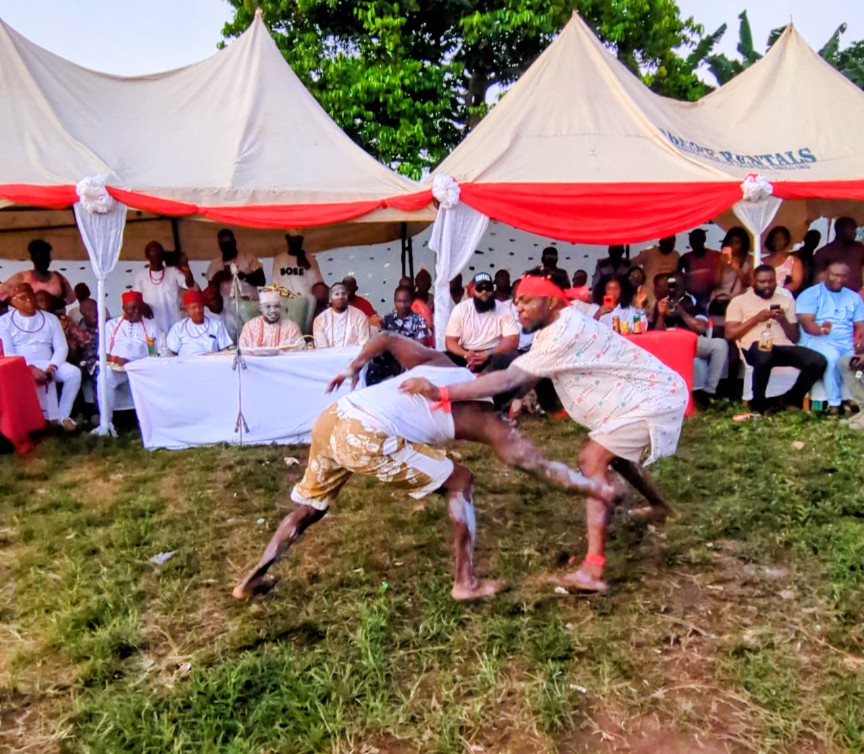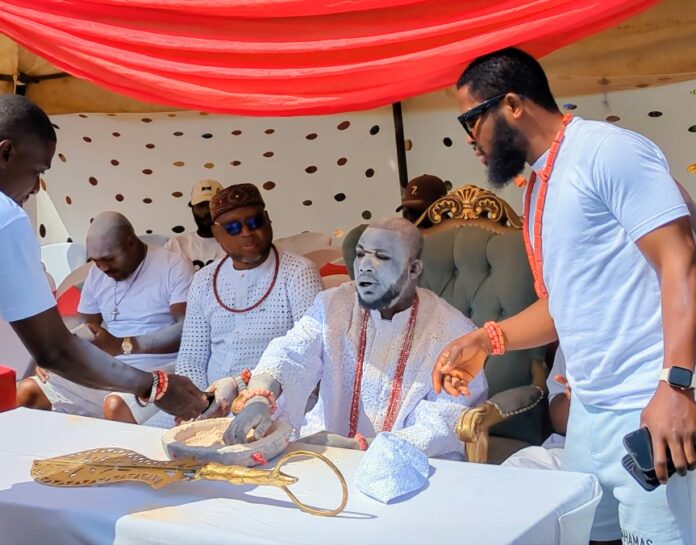Ubulu-Uku, Delta State — The ancient Ubulu-Uku Kingdom in Aniocha South Local Government Area of Delta State came alive recently as indigenes, both young and old, gathered to celebrate the Iwu Festival 2025 in grand style.
The annual event, known as one of the most important cultural festivals in the Anioma region, was led by Chief James Asika Ibori Onwordi, the Onishe Ezemu (Traditional Prime Minister) of Ubulu-Uku Kingdom.
A Festival of Culture, Peace, and Unity
The two-day celebration began with vibrant displays of dance, songs, and traditional rites. The Onishe Ezemu, dressed in royal regalia, led other traditional chiefs and villagers in colourful processions around the community, performing his duties as custodian of the festival.
The festival showcased culture at its peak as men, women, and youths soaked their bodies in mud and rubbed white chalk — a symbol of purity and peace — while dancing joyfully through the streets.
Drummers, singers, and dancers filled the air with energy, chanting traditional war songs and praises to celebrate the spirit of Iwu.
Speaking to reporters, Chief James Asika Ibori Onwordi described the Iwu Festival as “Ubulu-Uku’s Christmas celebration.” He explained that it is a period of peace, unity, and harmony among the people, celebrated every October with joy and togetherness.
“Iwu Festival is a festival of reconciliation and peace,” he said. “It brings the entire community together — no matter their differences — to dance, forgive, and celebrate as one family.”
Cultural Significance and Traditional Practices
The festival, which has been celebrated for generations, is deeply rooted in the customs and beliefs of the Ubulu-Uku people. It is believed to be a time for purification of the land, thanksgiving to the gods for a fruitful harvest, and the beginning of a new season of prosperity.

Different quarters — including Udo, Agbonta, Onitcha, Ogbe-Ego, Abu-edo, Aku, and Isho — joined the Onishe in paying homage at the Ezeiwu Shrine, dancing and chanting “Iwu! Iwu! Iwu!” in excitement.
Chief Ibori noted that like other festivals in the Anioma region, Iwu is a communal celebration with well-planned activities involving adults and youths. It is also believed to have evolved from the need to maintain harmony between humans and the spiritual forces of nature.
Music, Dance, and Traditional Characters
Every quarter of Ubulu-Uku has its own songs and dance steps, which are rarely performed outside the festival. The major instruments used include the Agogo (small gong), Ekwe (wooden drum), and Akpele (native flute).
Principal characters in the festival are the Ohene (Chief Priest), three Eze-Iwu, and Enem.
The Ohene wears a small white cloth called Akwa-Ocha, with a white feather tied to his head, while the Eze-Iwu and Enem dress in red. Their bodies are rubbed with Nzu (native chalk), and they are expected to be graceful dancers who entertain the crowd.

During the celebration, songs are composed to praise great sons and daughters of the land — as well as to ridicule those who have broken community rules. In ancient times, this served as a way to expose wrongdoing and encourage good behaviour.
Sacred Traditions and Rules
The people of Ubulu-Uku hold several customs sacred during the festival. Celebrants are not allowed to wear footwear during the Iwu, as the festival grounds are considered holy. Covering one’s feet is viewed as an act of disrespect.
Native chalk is also considered sacred and must be rubbed on the body by all participants.
Wrestling, Feasting, and Joyful Celebrations
One of the most exciting parts of the Iwu Festival is the traditional wrestling competition, which takes place on the eve of the main celebration. It is a friendly contest of strength and bravery, often used in the past as a way for men to prove their courage — and sometimes even win a wife!

After the contests, families and friends gather for a feast, sharing local delicacies, drinks, and laughter late into the night. Food is freely shared among villagers and visitors as a sign of unity and generosity.
Sacred Rituals and the Journey to the Mkpitime River
A major highlight of the festival is the sacred journey to the Mkpitime River by the Eze-Iwus and the Chief Priest. Each Eze-Iwu carries a sacred pot of water back to the palace of the Obi of Ubulu-Uku.
This ritual, known as Otito, symbolises purity, renewal, and the cleansing of the land. Failure to return with the pot of water is believed to bring grave consequences to the Eze-Iwu.
The final day, known as Idune-Iwu, marks the end of the festival. Crowds follow the Onishe and the Chief Priest to perform the closing rituals that bless the land with peace and prosperity.
Cleansing and Renewal of the Land
According to Chief Ibori, the purpose of the Iwu Festival is to cleanse the community from evil and ensure good fortune in the coming year.
“Once the festival is held, the land is purified,” he explained. “We thank the gods for a good harvest and pray for blessings, peace, and unity among our people.”
The festival, which bears similarities to the Iwu Festival of Ibusa, also includes important roles for the Obi of Ubulu-Uku and the Nne-Ubulu. Each plays a part in blessing the community and overseeing the sacred rites.
Culture That Unites Generations
For the people of Ubulu-Uku, the Iwu Festival is more than a celebration — it is a connection to their ancestors and a reminder of who they are.
Every October, the festival renews its bond as a people and passes its traditions to the younger generation.
As the drums fade and the songs end, one truth remains:
The Iwu Festival of Ubulu-Uku is not just a celebration of culture — it is a celebration of peace, unity, and identity that continues to define the Anioma people.
Watch some of the highlights:



